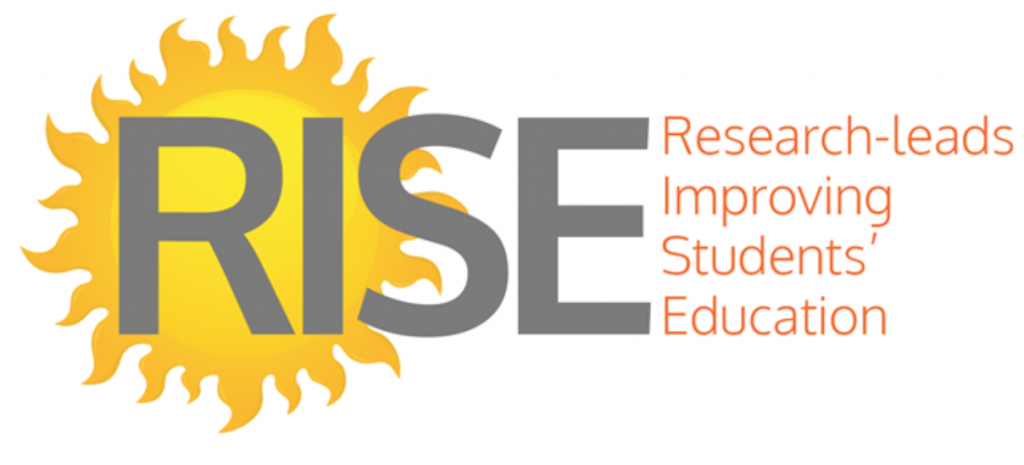
This week saw the publication of the Education Endowment Foundation RISE (Research-leads Improving Students’ Education) Project. It was one of the first projects in England that attempted to mobilise the emerging role of ‘Research-lead’ into a more specific school improvement process, with related training and support. With the rise in interest for research evidence over the past five years, it is a timely evaluation of the promise and challenges of putting evidence into action.
The RISE project evaluation – see here – is part of an emerging body of evidence that looks at how research evidence is accessed, interpreted and engaged with by schools and in schools (see this analysis of the ‘Literacy Octopus’ that trialled other methods of research evidence dissemination). Personally, I have been involved in brilliant education conferences, like researchED and NorthernRocks etc. but every teacher instinctively knows the trouble with the ‘knowing – doing gap’. So, you attend fantastic training, then on Monday – well… school happens! Is the same true of more extended training programmes? Lots of evidence would indicated that the best laid plans of teacher and school leaders go quickly awry, or are stopped at source by hardened school policies.
So what does the evidence on research evidence use show? It is really hard! Even if you go beyond one-off training, and attempt follow on support, and a full, supported programme, barriers to changing practice still exist. The RISE project tried to synthesise both robust evidence, alongside a process of critical analysis and careful application and evaluation (Prof Steve Higgins’ Banarama principle apply here: ‘it isn’t what you do, it is the way that you do it’!).
Though all the summary evaluation of the RISE project of course interests me greatly (I have a lot of personal investment having led the trial!), it is the more nuanced findings about the nitty-gritty reality of what was required to make a change in school that is the most salient. From page 40 of the evaluation – ‘Implementation and Process Evaluation‘ – it digs into that detail.
‘Necessary conditions for successful implementation’
Crucially, the evaluation analyses what support factors were needed for the project, and Research-leads, to make a change in school. Of course, these insights are useful and instructive for school improvement far beyond the scope of aiming to establish Research-leads. SLEs, NLEs – new middle leaders, SLT – most roles that require substantial change. So what is the judgment?
“Those schools who appear to have had the most successful local implementation of the RISE programme had in place the following key conditions:
A Research Lead who had developed strong relationships within the school, both with senior leaders and ‘ordinary’ teachers. Those with these pre-existing positive relationships commanded more respect and had a stronger platform for asking for colleagues to consider research evidence and try changes to their practices.
Active and visible support of the Headteacher for the principles behind the RISE programme. When such support was in place, Research Leads were given a higher profile to challenge normative practices and to carry out local innovation and evaluation. In these situations, greater resources werealso present for the Research Lead’s role, e.g. paid time away from teaching responsibilities, a budget for evaluation etc.
Following on from this, additional ring-fenced time to undertake the role of Research Leadconsiderably improved the ability to turn the RISE training into local action.
As well as support from the school Headteacher, it was beneficial when there was a strong linkbetween the Research Lead and the school’s Teaching and Learning Co-ordinator – such co- operation allowed for greater research lead impact and input with CPD.
To enact local change, Research Leads found it easier when they had a solid understanding of their school attainment data. Those that were familiar with interpreting such data and had a global overview, found it easier to construct local research-based strategies to target issues of greatest local concern.” (page 46, ‘The RISE Project Evaluation Report’)
It is important insights like these gleaned from research projects based in schools that help us better steer school improvement going forward. Awareness of research evidence may be on the rise, but the difficult process of implementing new practice needs more careful thought.
Note of thanks: The RISE project gave me the personal benefit of working with Professor Rob Coe and Professor Stuart Kime – whose wisdom and expertise gave me the most invaluable training of my school career. I also learnt a huge amount from the team at Huntington and the fantastic group of research-leads from the project.